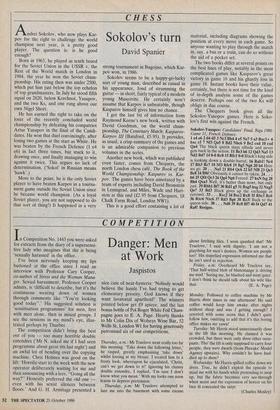CHESS
Sokolov's turn
David Spanier
Andrei Sokolov, who now plays Kar- pov for the right to challenge the world champion next year, is a pretty good player. The question is: is he good enough?
Born in 1963, he played as tenth board for the Soviet Union in the USSR v. the Rest of the World match in London in 1984, the year he won the Soviet cham- pionship. His rating then was under 2500, which put him just below the top echelon of top grandmasters. In July he stood fifth equal on 2620, below Korchnoi, Yusupov, and the two Ks, and one rung above our own Nigel Short.
He has earned the right to take on the loser of the recently , concluded world championship by defeating his compatriot Artur Yusupov in the final of the Candi- dates. He won that duel convincingly, after losing two games at the start as White. He was beaten by the French Defence (1 e4 e6) in fact three times, but stuck to it, drawing onee, and finally Managing to win against it twice. This argues no lack of determination. ('Sokol' in Russian means 'hawk'.).
More to the point, he is the.only Soviet player to have beaten Karpov in a tourna- ment game outside the Soviet Union since he became world champion. (As a loyal Soviet player, you are not supposed to do that sort of thing!) It happened in a very strong tournament in Bugojno, which Kar- pov won, in 1986.
Sokolov seems to be a happy-go-lucky sort of young man, described as casual in his appearance, fond of strumming the guitar — in short, fairly typical of a modern young Muscovite. He certainly won't assume that Karpov is unbeatable, though Kasparov himself gives him no chance.
I got the last bit of information from Raymond Keene's new book, written with David Goodman, on the world cham- pionship, The Centenary Match: Kasparov- Karpov III (Batsford, £5.95). It provides, as usual, a crisp summary of the games and is an admirable companion to previous volumes in the series.
Another new book, which was published even faster, comes from Chequers, the north London, chess café, The Book of the World Championship: Kasparov vs. Kar- pov. The games have been annotated by a team of experts incliiding David Bronstein in Leningrad, and Miles, Wade and Hart- ston at this end (f2.95 from Chequers, 18 Chalk Farm Road, London NW1).
This is a good effort containing a lot of Material, including diagrams showing the position at every move in each game. So anyone wanting to play through the match in, say, a bus or a train, can do so without the aid of a pocket set.
The two books differ at several points on the best lines of play, notably in the most complicated games like Kasparov's great victory in game 16 and his ghastly loss in game 18. Instant books have their value, certainly, but there is not time for the kind of in-depth analysis some of the games deserve. Perhaps one of the two Ks will oblige in due course.
The Chequers book gives all the Sokolov-Yusopov games. Here is Soko- lov's first win against the French.
Sokolov-Yusopov: Candidates' Final, Riga 1986: Game 11, French Defence. 1 e4 e6 2 d4 d5 3 Nc3 Bb4 4 e5 Ne7 5 a3 Bxc3+ 6 bxc c5 7 NO Qa5 8 Bd2 Nbc6 9 Be2 cxd 10 cxd Qa4 The black queen stays offside and never gets back'in the action. 11 Be3 b6 12 Qd3 Na5 13 Nd2 Bd7 140.0 Rc8 15 Rfcl 0-0 Black's king side is looking down a double-barrel. 16 Rabl! Nc4 17 Rb3 Rc7 18 Nf3 Rfc8 19 Bg5 Ng6 20 h4 Here we go. 20 . . .Na5 21 Rb4 Qc6 22 h5 Nf8 23 Qe3 Be8 24 Bf6! Obviously it cannot be taken. 24. . . h6 25 Qf4 Qc3 26 Qg4 Ng6 Forced. 27 hxN fxg 28 Bh4 Qxa3 Well, it's better than nowt, but only just. 29 Rbh11317 30 Rdl g5 31 Bxg5 hxg 32 Nxg5 Qe7 33 Bd3 Black gives up the exchange in extremis. .33. . . Rxc2 34 Bxc2 RxB 35 Rbcl Rc6 36 Rxc6 Nxc6 37 Rd3 Bg6 38 Rc3! Back to the queen side. 38. . . Nd8 39 Rc8 Bf7 40 f4 Qd7 41 Rag! Resigns.


























































 Previous page
Previous page